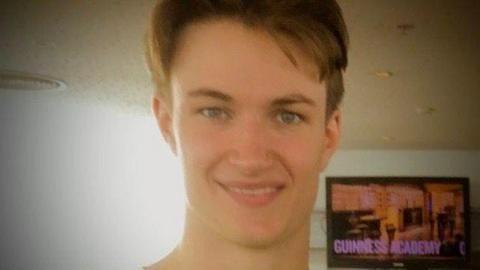Lifeguard thought pool death swimmer was training, trial told

Christopher Rogers was 20 when he died at the Orchard Leisure Centre in Armagh in April 2017
- Published
One of three lifeguards on trial following the death of a man at a pool in Armagh, said he didn't intervene earlier because he believed he was engaged in a training activity.
Christopher Rogers, 20, died as a result of a swim session at the Orchard Leisure Centre in Armagh in 2017.
Cathal Peter Forrest McVeigh, 35, of Dunamony Road in Dungannon, James Monaghan, 26, of Folly Lane in Armagh and William Holden, 26, of Unshinagh Lane in Portadown were on duty the night he died.
They each face a single count that being employees, they "failed to take reasonable care for the health and safety of other persons who may be affected by [their] acts or omissions at work". All three men have pleaded not guilty.
Newry Crown Court previously heard that on the day of his death Mr Rogers, who was an experienced swimmer, had been swimming underwater for about a minute before breaking the water's surface.
He then descended to the bottom of the pool and lay there for five minutes and 14 seconds before a rescue attempt was initiated.
He was later pronounced dead.
A coroner said he had lost consciousness due to a lack of oxygen.
'I didn't continue as a lifeguard'
Giving evidence on Thursday was William Holden.
He told the court he had just turned 19 at the time of the incident and had been a qualified lifeguard for just under a year.
He was working as a casual lifeguard whilst studying for a degree at Ulster University.
Mr Holden said there was a change within weeks of the tragedy at the centre.
"There were posters all over the centre saying you couldn't stay under for more than 15m.
"I didn't continue as a lifeguard. I didn't feel comfortable in the atmosphere."
Mr Holden said Mr Rogers was a regular at the pool and a "really good swimmer".
On the night of the incident, he said Mr Rogers was swimming under water and holding his breath at bottom of pool working to improve his lung capacity.
Court heard, Mr Holden had been observing the pool from the poolside high chair.
He had been due to be relieved at 21:15 but the other lifeguard didn't arrive until 21:18.
Upon leaving the high chair, Mr Holden said he had no concerns about Mr Rogers who was already on the floor of the pool.
However, minutes later Mr Holden recalled seeing Mr Rogers being pulled from the pool.
"I ran around and hit the alarm."
Mr Holden said he was then involved in performing CPR and rescue breaths.
Following Mr Rogers death, he said he and other workers at the centre attended his funeral.
"It impacted me quite badly," he said.
"Lifting out someone your own age. It'll never leave me."
Under cross examination from Geraldine McCullough, Mr Holden said he had made assessments not assumptions about Mr Rodgers's condition.
Ms McCullough highlighted that these were incorrect.
"Yes with hindsight," he said.
'I thought he was being stubborn'
Ms McCullough was also critical of the length of time Mr Holden remained poolside talking to his colleague.
"From the CCTV it looks like you were looking at him and talking about him but not trying to get him up. I suggest you should have jumped in.
"You'd know at some stage he'd have to come up for air?" she said.
"Yes," Mr Holden replied.
Ms McCullough then asked why, if the defendant was unconcerned about Mr Rogers condition, had he asked fellow lifeguard Mr McVeigh to bang a metal pole off the pool steps?
Mr Holden said this was to get Mr Rogers's attention.
When pressed why he didn't intervene when Mr Rogers didn't respond he said, "I thought he was being stubborn, for us interrupting his training.
"We did what we thought was the best thing to do at the time."
Ms McCullough added: "You ought to have realised there was a risk based on what was going on in front of your eyes and you ought to have carried out a rescue."
In response Mr Holden reiterated that he didn't believe anything was wrong.
The trial resumes on Monday.